#(for the reagan trace)
Explore tagged Tumblr posts
Text
trans girls will say "yeah i play ttrpgs to stop thinking about the real world" and then play a character with no legal rights in a setting where all of the major conflicts are caused facists and capitalists
#it's me im trans girls#lancer#lancer rpg#im playing a fully sapient nhp#its so funny looking at this setting and tracing every challenge union faces back to seccomm like they're ronald reagan
427 notes
·
View notes
Text
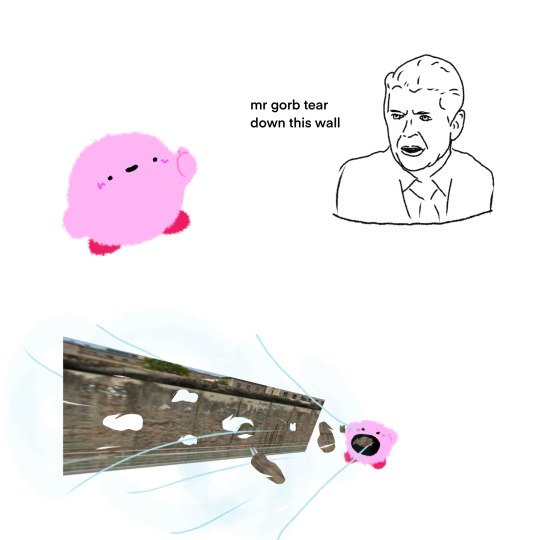
#kirby#cursed image#(for the reagan trace)#ronald reagan#daily kirby#my art#digital#hal laboratory#nintendo#my partner has been asking for ages for a gorbachev pun#my friend sent me a different gorbachev pun yesterday#when I told her about my partner's request she was like 'well obviously you have to'#which shook loose this uh. thing.#I think it's funny so whatever#it kind feels like it needs a third panel but I lost an hour to managing a crisis#so I don't wanna waste time thinking of one -n-#(everyone is fine)#this reagan trace is extremely cursed honestly.#what have I wrought.
160 notes
·
View notes
Text

5 notes
·
View notes
Text
i’m gonna miss the TikTok acc @/ronaldreagannews sm it makes my body ache. i am in pre-death mourning. i’m crestfallen. it feels as though my traveling soldier will never return.
nearly every day they would post a reminder to us, We The People, that Ronald Reagan is indeed still dead. what will i do without this service? it has already been a couple weeks since i deleted the app and life hasn’t been the same since.
this one was on my bday.
#tiktok ban#gen z politics#leftist#leftblr#fuck ronald reagan#reagan ruined everything#every major issue our nation has today can be traced back to reagan#i bet i can find a connection to reagan and someone tripping#dude indirectly helped form Al Qa'eda#there are entire lists of his atrocities#project 2025#heritage foundation
2 notes
·
View notes
Text
"deregulation caused this" cooperate greed and disregard for the health and safety of the working class caused this. regulation is a bandaid. anarchy + burn it down.
#EVERYTHING CAN BE TRACED BACK TO TRUMP BACK TO BUSH BACK TO REAGAN#how many times do we have to do this back and forth panic-complacency cycle before we just.#admit capitalism is the actual problem.#please.#the government isn't gonna save you#please please please#and please start giving a shit about issues besides usa domestic policy#dems are just gonna give you just enough to settle you back into complacency and continue to be evil#just more quietly than the GOP#P L EA SE.#i can't take it anymore
0 notes
Text
every once and awhile a post (and there are a few of them) will go around about how every bad thing in American life can be traced back to Reagan, and generally speaking this often times true enough.
but more and more I'm feeling like we're living through the anti-Reagan Revolution rn, that like in 40-ish years on whatever sci fi social media people will pass around the same kind of posts about the good things that have happened and the answer will be "Biden"
actually got serious on climate change? Biden
closed the racial wealth gap and brought about racial equity to the US economy? Biden
finally dealt with student loan debt? Biden
dealt with failing roads and bridges that we hadn't repaired since Reagan? Biden
brought drug prices under control and started capping them? Biden
idk its weird to live through a Revolution that everyone wants to ignore but such is life
2K notes
·
View notes
Text
LaDS Men Reaction to You as a Parent

AN: I miss my mom 😭 I love her so much. She's sooooo precious.
Pairing: LaDS boys x fem reader
Genre: Hurt and comfort
Ingredients: 90% comfort, 10% angst
My Fav: Caleb and Xavier

Xavier:
He knows the look. The way your hands fuss with the curtains long after sunset, how you peer out the window like the past might knock and ask to be let in. You’re restless.
He doesn’t say anything, he never does. Just watches you pace. Waiting for the triplets. Kassandra, Reagan, and Pam. Twenty-somethings now, but still your babies. You count the days until they return like a soldier marking calendar walls.
And tonight, like clockwork, you turn to him with that same eager light in your eyes. “Shall we sit outside in the yard? Get the firepit going? I got their favorite sweet potatoes.” You tug on his hand like you’re twenty again. “Let’s go, honey. Please?”
He’s already moving. The shawl is in his hands before you finish the sentence. He drapes it over your shoulders, presses a kiss to your temple, and follows you out without another word.
You sit in the yard together, hand in hand, listening for laughter that hasn’t arrived yet. But it will. It always does.
He doesn't need to say it aloud, but in his silence, you’ll always hear it: Watching you love them like this… it makes him love you more.

Rafayel:
You always wanted a quiet life. He remembers how you laughed the first time he said he’d give it to you. “Quiet’s not in your blood,” you teased.
But when Alaric was born, your son with his lungs and your fragile heart, you changed. Or maybe you returned to something truer.
You gave up the Hunter’s Association. The title. The power. You traded it all for hospital chairs, medical journals, and the quiet war of waiting rooms. And he watched you, time and time again, fold yourself into the margins of your son's life just to keep him breathing.
Not once did you ask why this happened. You only asked how to help.
Now Alaric sits in your old chair at the Association. Heart full, future wide. And Rafayel sees it every time you look at him, that flicker of disbelief. Like you still can’t believe you won.
And maybe that's what he admires most about you: you never stopped being a fighter, you just learned how to fight for something smaller, and infinitely more precious.

Zayne:
He sees it before you even speak.
The way your hand hovers above the table, over that one plate you always used to set first. The way your fingers curl in, then pull away, like grief lives in your bones now, like it whispers, not yet, not this time.
Aching to reach for the daughter who slammed close the door to her room. Leaving the dinner untouched.
You never ate without her. Not once. Not since the day she was born. Feeding her was your love language. Her plate was always first, always warm, always right. And now you sit across from him with a smile stretched too tight and a silence that doesn’t quite settle.
“I forgot dessert,” you say, too fast. “We should have something sweet. For your promotion.”
He doesn’t move right away. Just watches you walk to the kitchen, not like you’re hungry, but like you’re searching. Like if you just bake the right thing, if you get it just right, maybe the world will tilt back into place.
Zayne stands and follows, reaching for your hand before you disappear again. His thumb traces the ridge of your knuckles, soft and trembling.
“She’s not mad at you,” he murmurs, eyes steady on yours. “You did nothing wrong. She loves you.”
You blink, and your tears fall quiet, like they always do. Witnessing a drifting relationship once so cherished.
And he thinks, if loving someone is a sacred act, then parenting is its own kind of worship. And grief… grief is the altar where that worship never ends.

Sylus:
You left.
You loved him, but your love for your children outweighed it. And when he wouldn't stop, wouldn't turn his back on the life that had no room for them, you made the only choice you could.
You walked away. From him. From the danger. From the man who clung too tightly to a throne of blood, head of Onichynus, feared in every shadowed corner, yet too much a coward to surrender his power for peace.
You left behind divorce papers, and all the love you once carried.
Because you knew: it would only take one more threat. One wrong name whispered. One misplaced vendetta. And your children would pay the price.
He hated you for it. Said you turned them against him. Blamed the caution in their eyes, the distance in their hugs, on you.
But the truth is, he forgot. Forgot why he found you in the first place. Forgot the lifetimes that led him to your door. Forgot that everything good in him only ever came alive when you looked at him like he could be more.
Now it breaks him, not just that you left, but that you were right to. That you were strong enough to put your children first.
And that he was the reason you had to do it alone.

Caleb: (trans fem child)
He stood in the hallway, unseen. The morning light poured in through the half-open door, catching on your hands as you worked, parting strands of hair with steady, practiced care.
Fifteen years. He’s known her every day of them. His kid. Your kid. Raised together. Held through scraped knees and whispered nightmares. But today, today was different.
Today, you saw her.
Not the version the world forced on her. Not the shape they assigned. You saw her. And you didn’t hesitate. Didn’t freeze. Didn’t look to him for direction. You just met her where she was, as if you’d been waiting to do it since the day she arrived.
"Do you feel bonita?" you asked, voice soft and warm, teasing just enough to draw out that flicker of a smile. He watches her shoulders drop, just slightly. A breath let go. A bit of armor lowered.
She nods. Doesn’t say a word. She doesn’t need to. In that moment, she is safe. She is known.
And Caleb, Caleb feels something sharp crack and re-form inside his chest. Something quiet. Old. Holy.
Because you didn’t treat this like some revelation. You didn’t flinch. You didn’t mourn what was never yours to grieve. You just braided her hair like it was the most obvious, natural thing in the world.
And gods, that’s what wrecks him. He’s spent his whole life trying to shield her from a world that doesn’t know how to see people like her.
But you? You didn’t just see her.
You recognized her.
And standing there in the hallway, fists clenched and heart full, Caleb thinks: There is no war he wouldn’t fight for this. For her. For you. For the quiet kind of love that makes people whole again.
#love and deepspace#love and deepspace sylus#love and deepspace caleb#love and deepspace headcannon#love and deepspace x reader#sylus x reader#xavier x reader#rafayel x reader#zayne x reader#zayne love and deepspace#caleb x reader#love and deepspace reaction#love and deepspace xavier#love and deepspace zayne#love and deepspace rafayel#angst#comfort#fluff#fem reader
303 notes
·
View notes
Text
Virtually the societal ills we face today trace back largely to Reagan in the ‘80s. He gave us increased racism and bigotry, homelessness, economic strife, union busting, entanglements in the Middle East, a devastated economy, the war on the middle class, unrestrained corporate greed, etc. We still haven’t recovered from his war on America four decades later.
Trump’s war on America I’d the final nail in the coffin, He’s taking us back to the Gilded Age at the end of the 1800s. We may likely never recover and if by some chance we do it will take more than a hundred years to get back to economic prosperity and social equality.
Our only hopes would be massive general strikes nationwide like they have in Europe. Swamping DC to the point nothing can move or get done like during the Vietnam era protests would be another tactic. Nationwide protests to accompany the general strikes to shut everything down and make life and business unbearable for the Republican/CEO/oligarch class. Our best bet would be to follow up with a massive turnout in the 2026 mid-term elections where Democrats take overwhelming control of both the Senate and the House of Representatives. If we could do that we could impeach Trump, his unqualified appointments, and the illegitimate SCOTUS. Then we would have to keep control of the Congress and Whitehouse for several terms. During this time we could remove oligarch dark money from politics (Citizens United) and prosecute them for their fiscal crimes and treason.
It’s also highly likely that the Republicans are going to turn the police and military against us soon.They will do this to block our organization and definitely if we begin to protest or retake Congress. We’re headed to political violence and perhaps a civil war soon. Even if we continue to do nothing large swathes of our population will suffer brutality. This has already begun with ICE.
😾
#union busting#federal workers union contracts#republican assholes#maga morons#traitor trump#crooked donald#oligarchy
120 notes
·
View notes
Text
Dont let Human Pet Guy find this.
I had the strangest dream last night that I was keeping Ronald Reagen as a pet. Like he was being forced to walk on all fours and wear a leash. He slept in a cage in the basement lined with newspapers, and he wasn't allowed up on the furniture.
This is stricter than I treat my actual dog in real life (who regularly sleeps in bed next to my mom), and frankly given what his economic policies did to my country, I think it's too good for him.
#shitpost#please tell me he was clothed#actually no please dont tell me any further details i have read enough#god i hate ronald reagan#any bad thing in recent us history can be traced back to this man. im an american studies major so im right.
7 notes
·
View notes
Note
ayo idk if this question has been asked before but did you have any character inspirations for nat, reagan and the demon dude? like, were they were inspired by any movie/tv show/video game characters or any ppl irl? ik the demon dude was probably based off of biblical lore (i feel like i heard you mention this, correct me if im wrong) but idk much about nat and reagan and i was wondering if there were any particular aspects that went into their personalities or any specific character designs choices. basically, how did you come up with their personalities and character designs lol. PS love your drawings <3
Tyyy and yep! Rabel was based off of Christian lore along with some other stuff, I talked about it a little before but there's more to it that I can't say at this time muahaha
As for Nat and Regan, I'll talk about them a bit under the cut! Here's the very first designs I made of them lol.
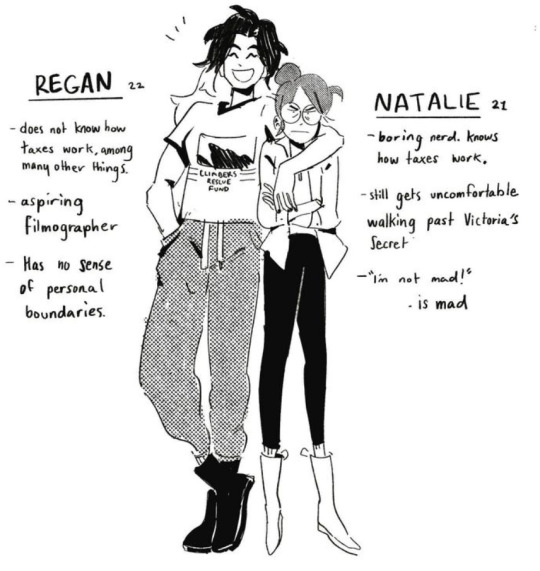
Originally Regan was conceived as a red herring candidate for the demonic possession who was actively seeking an encounter with the occult so I themed her to look kind of spooky and edgy. Over time, that aspect sort of got pushed out by how the plot was coming together and her character became more about opting out of agency over her own life and sitting back while the world around her did its thing, so she kinda morphed into being a disheveled losergirl who wears big clothes.
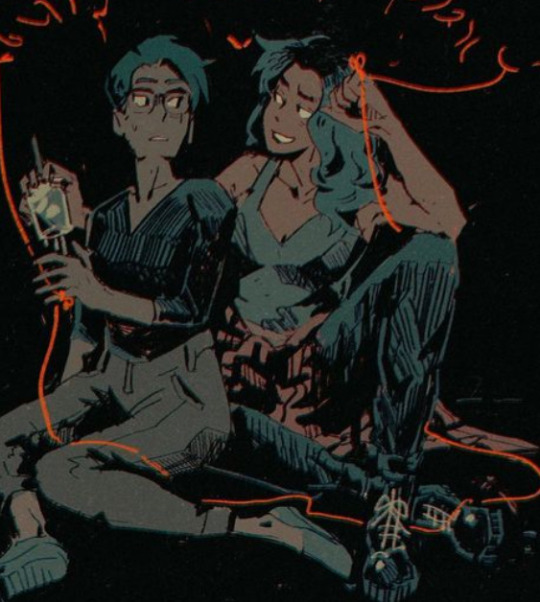

The idea behind Nat was to go in the opposite direction of Regan's original concept. Someone who looked clean cut and unassuming but felt small and powerless and restrained in every aspect of their life; the actual ideal target for a demon. Only thing that really changed about her is she looks gayer now.
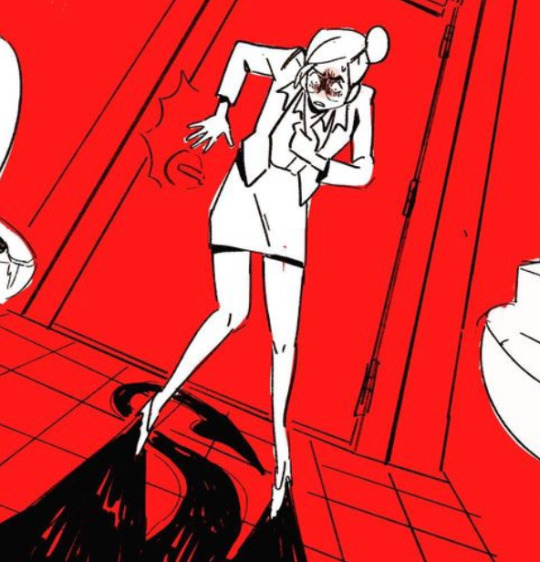
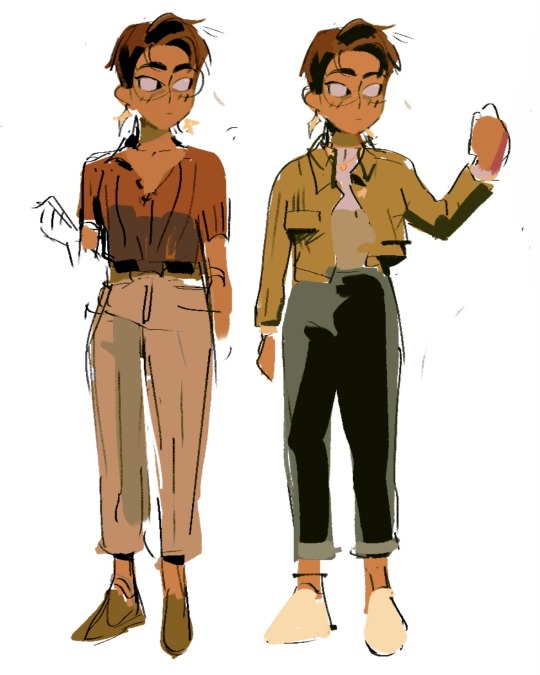
In terms of external influences, there's some Jennifer's body baked into the premise for sure but additionally I'd say that the true sourdough starter for their personalities/dynamic can be traced back to... butterfly soup Noelle and Akarsha..

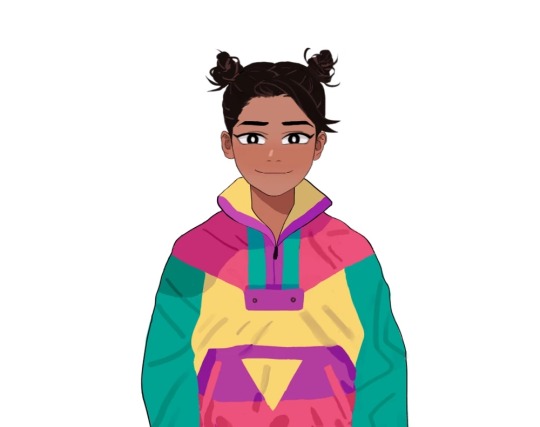
299 notes
·
View notes
Video
youtube
Biden vs. Trump: Whose Economic Plan Is Better for You?
Trump failed to deliver on his number one campaign promise:
President Trump presided over a historic net loss of nearly 3 million American jobs, the worst jobs numbers ever recorded under an American president.
This is no fluke. America’s economy has almost always done worse under Republican presidents. A New York Times analysis found that since 1933, the U.S. economy has grown nearly twice as fast on average under Democrats.
Now Trump’s defenders claim it’s not his fault that the economy collapsed under his watch. It was the pandemic. But there are two big things wrong with this.
First, the pandemic recession was as bad as it was because of Trump. His failure to lead with any national strategy left America in chaos throughout 2020, long after other nations had developed coordinated testing, tracing, and social distancing plans that allowed them to reopen their economies.
But secondly, even before the pandemic, Trump failed to deliver on his economic promises. Job growth slowed under Trump.
America added more jobs in President Obama’s last three years than in Trump’s first three.
Even before the pandemic most middle-class American households saw their incomes go down under Trump.
Trump’s major economic policy was cutting taxes on the rich and big corporations. He promised it would result in $4,000 annual raises for workers. How did that work out? Did you get a $4,000 raise?
Republicans keep claiming that if we just cut enough taxes on the rich, the wealth will “trickle down.” But it never works. Wage growth slowed after Reagan’s tax cuts for the rich and big corporations. And the Bush and Trump tax cuts didn’t trickle down either.
These giveaways to the wealthy came at the expense of investments in infrastructure, education, and health care, making life more expensive and difficult for everyone who isn’t rich.
They also exploded the debt and deficit. Reagan oversaw a 186% increase in the national debt — the biggest percentage increase in over 70 years. The Bush and Trump tax cuts, that mostly benefited corporations and the rich, are the main reasons why America’s debt is growing faster than the economy.
Republican presidents have led us into the three worst economic crises of the last century, and Democrats led us out of them.
Republicans talk about running the country like a business, but they want to run it the way Trump ran his businesses: with massive debts, a string of failures, and payouts for the folks at the top, while workers get shafted again and again. Given Republicans’ track record, why would any hard-working American put their financial security in the hands of a Republican president ever again?
403 notes
·
View notes
Text
one thing that eventually strikes you after not a lot of time exposed to them is the sheer shallowness of most liberals' reasoning. Usamerican democrats are not the only kind of liberal of course, but their incessant presence means this post is mostly based on them. Liberalism in itself isn't necessarily shallow, even if idealism is, IMO, a very limiting framework. But it is overwhelming how simplistic and even childish these people can get.
It's less that they argue with what you say but rather throw a series of phrases and simple ideas that sound related to what you said. It's uncountable the amount of times liberals' reply to posts of mine talking about electoralism and the marxist position on it (which is more nuanced than "don't vote") just boil down to "but trump", even though most times I'm not even talking about the US, or "well what else do you propose doing" and then ignore the many times I've talked about that, sometimes in the very same post they're replying to. And there is no depth here, there is no substance to take apart in the first place. What I'd consider a respectable liberal explanation on voting; civicism, the idea of representative democracy, how you have to make yourself heard, etc, do actually have some substance and an ideological background. But there is none in this case, none whatsoever. Lesser-evilism is probably the most complicated idea the common USamerican democrat will defend, but that framework only makes sense in actual dichotomies without any alternative choices, which electoralism never is. That's why they like the trolley problem so much, as well. It's an illusion of depth that falls apart as soon as it's constrated with reality.
Let's take another example, liberal opposition to revolutions. The developed liberal opposition to them goes along the lines of the violation of private property and an outright rejection of a class-based analysis of society, of course this argumentative line will vary depending on who's talking. But the vast, vast majority of usamerican democrat liberals who even engage with revolutionary ideas in the first place will not go there and instead, never thinking outside the context of the US of course, will argue nonsense and essentially just call you bloodthirsty, and parrot truisms like "at the end of the day, it will be the common people and/or minorities who suffer the most".
There are no traces of actually engaging with what the other person says, they have lodged themselves in the narrowest worldview possible and will not even let their gaze stray from it, let alone venture out of it. No intellectual curiosity, no willingness to think about other contexts than the US post-2016 and maybe Reagan's years. I can't decide if this attitude is more pathetic or pitiful. Not even expecting them to agree with me, that's their prerogative. There seems to be just no desire to ever change an opinion
158 notes
·
View notes
Text


#The War on Drugs- while exacerbated by Reagan- was really kicked into high gear under Nixon.#Nixon's victory in 68 was built on the back of the Evangelicals Reagan supported in the 80s#Some if not most of the issues that can be traced to Reagan's actions (or lack thereof) can be pulled back farther.#Whether to Nixon or even Hayes and Johnson (the other one)#Anyway I'm not the resident nixon expert that's the-parallax-view#but Reagan is noted to have looked up to trick flip dick
17 notes
·
View notes
Text

Today, we're excited to bring you the third part to our historical rec list! You can find part one here and part two here. Check out these amazing fics and be sure to show the authors love. If you enjoy our rec lists, please be sure to like and reblog this post to help spread the word. Happy reading!
1) Late Night Train Ride | Explicit | 4,347 words
Harry thought his assistant’s insistence on getting him a private car for what was a mere few hours long ride was pompous and preposterous - up until he walks into Louis.
2) Smile for the Camera for It Knows Everything, Hollywood Star | Mature | 6,676 words
Prompt 132- The story of Nancy Reagan being called the blowjob queen of Hollywood but it’s Louis.
3) More, More, More | Explicit | 8,733 words
1980s AU. Harry is a singer and Louis is a groupie that Harry sleeps with. He becomes Harry’s inspiration for writing Rebel Yell by Billy Idol.
4) Only You And You Alone (Can Thrill Me Like You Do) | Explicit | 13,346 words
Harry wrinkles his nose as he fights Louis' dress to get his hands underneath it, panting deeply. "Alpha..." "I'm still hungry, Louis," he claims with a severity that is derailed by his ragged breathing. "I thought I heard you say you were going to take care of everything."
5) Falling Down For You | Explicit | 14,750 words
If there was an alpha that Louis wanted to call his, it would be Harry. But what happens when an arranged marriage, a hungry press, and doubts get in the way?
6) Dance Like Waves Along The Wind | Explicit | 17,019 words
“What are you doing to me, my liege?” the God of the Sea murmured as he slid an arm around Louis’s slender waist. Louis’s breath stuttered and his grip on the ruby red apple tightened just as Harry’s did around his body. “I am hardly your liege, in this relationship,” he whispered out, tilting his head up to gaze at Harry’s imperceptibly dark eyes. “No?” Harry inquired. “Am I not at the mercy to follow your every order? To cater to your every whim?” Louis’s lips parted as he swallowed thickly, Harry’s eyes tracing his bobbing Adam’s apple intently. “Are you?” were the only words he could get out in response before Harry was dipping down to press a heated kiss against his lips.
7) Across the Grey, Salty Sea | Explicit | 19,968 words
Prompt 212: Alex from Dunkirk and French escort/prostitute Louis who ends up in Alex’s quarters more nights than not. Alex gives him his dog tag to wear maybe just a lot of smut and dirty talk with Louis being a pretty princess.
8) Limelight | Mature | 20,046 words
During his first semester at Boston University circa 1989, a shy, socially awkward Harry meets a kind, outspoken Louis. In an attempt to show Louis how he feels, he creates a mixtape of songs. But Harry’s deep anxieties cloud him, and he can’t seem to understand whether or not Louis even wants him around, let alone likes him back.
9) Manners And Misjudgements | Explicit | 21,178 words
“Everyone you mention the Duke to raves about him, just like you are defending him now. But no one looks behind the façade he so ably maintains to deceive you all.” Liam sighs deeply. “You sound like a crazy man right now, Louis.” “I will prove to you who the Duke really is, just wait.”
10) Splash Me Across The Silver Screen | Explicit | 22,851 words
Harry shrugged. “Maybe you just need to get even more outside your comfort zone. Maybe we need to try something a bit more… adventurous?” Curiosity successfully piqued, Louis tilted his head and toyed with the fringe dangling from his lace shrug. “Like what?" “We, uhm—maybe we try filming you in more compromising positions,” Harry suggested carefully. He kept his tone low and even as he studied Louis’ expression, hands skating over his curves soothingly. If Louis didn’t know any better he might have thought that Harry was talking about filming him naked. But that couldn’t be right—could it? “Like porn?”
11) Like Rabbits In Cigar Smoke | Explicit | 26,088 words
Los Angeles 1975. The rules to being a Playboy Bunny are very clear. Keep the clients happy while still protecting the brand. Bunny Louis tries very hard to keep to that, and no amount of longing stares or soft touches from world-wide famous rock star Harry Styles is going to change that. He's not that kind of Bunny, right?
12) Lust For Life | Explicit | 32,708 words
The 1970s au where the pressure of being an aging starlet begins to weigh heavy on Harry’s heart before he meets Louis.
13) Last Blues For Bloody Knuckles | Explicit | 34,329 words
Styles was a name everyone knew. It had evolved into something of a fairy tale, a far away problem that normal people didn’t have to deal with. Louis never thought he’d find himself falling in love with him. When he finds himself pregnant with Harry’s child, he knows he has to leave the life, and Harry, behind. For her sake. He never expected Harry to show back up on his doorstep five years later. A mob au.
14) Once Upon a Time | Explicit | 37,079 words
Since Louis' mother's death, her book of fairy tales has offered Louis an escape from the tower that he is locked inside for much of the day. However, when his father announces that Louis has been betrothed to the cruel king of a neighboring kingdom, Louis quickly realizes that even the comfort of his fairy tales will not be enough to shield him from the harsh reality of his life. Embarking on a long journey to his new home, Louis is accompanied by his maid and a small group of soldiers, led by Captain Harry Styles. As Louis begins to experience the world beyond his prison and learns more about the people escorting him, he finds himself drawn to the mysterious Captain. But with every step closer to his impending marriage, Louis is forced to confront the life he's being thrust into—and the painful truth that he may never have his happy ending.
15) The Royal Midwife | Explicit | 40,233 words
Louis has called himself the "Royal Midwife" since his mother passed away. When the King summons him, he expects to be stripped of his stolen title. What he doesn't anticipate is that he will be be kidnapped and taken to the neighbouring kingdom, where he is expected to give the apparently infertile Crown Princes an heir.
16) Hold Me How the Deep Night Has | Explicit | 48,018 words
Louis Tomlinson needs a change. Stuck in a cycle of going to the job he hates, spending time with his friends, and avoiding the one man he hates most in this world, Louis' in desperate need of something new. So when he discovers an abandoned notebook on the way to work, the decision is easy to take it for himself and begin a journal amidst the empty pages. What can't be expected are the words that appear overnight directly beside his own, written on the same day 400 years in the past. What are the consequences of a magical connection between two men of different centuries? And who, among it all, is the mysterious E who only exists on the other side of Louis' journal?
17) Oubaitori | Explicit | 48,822 words
After a year away, Harry comes back to his hometown ready to shoulder the responsibilities that come with being a Styles. However, an unforeseen return will greatly setback his plans as he finds himself confronting ghosts of the past, his prejudice, and a torrent of feelings he thought were long-buried. In the midst of a battle between protection and progress, trust that was once broken will try and pierce through walls of convictions he built around himself, leaving him grasping for power he is unsure he even wants. Meanwhile, Louis merely tries to save his family and make the next day better than the last. As he faces his past wrongdoings and the scars they left, chances will be granted to him - either to repair what was once broken or finally find closure. Torn between the desire to defend himself and the fear of the truth being rejected, he will learn peace comes from honesty - and that sometimes, what appears to be the easiest solution simply was the most coveted one.
18) A Certain Satisfaction | Explicit | 51,659 words
“Sit, sit, please,” he said, so Louis sat, folding up his hands in front of him. Harry cracked up his bottle of water, looking at Louis for a long moment as he took a drink. When he was done, he set the bottle on the desk, then pulled his sunglasses down the bridge of his nose, looking at Louis over the edges of the frames. “So,” he said, “Louis. Do you have any previous experience with pornography?” Louis blinked, shuffling his feet. “I’m sorry, what?”
19) Don't Want No Other Shade Of Blue | Explicit | 58,649 words
“I know you’re putting on an act,” says Harry after a moment, and Louis scowls when he realises the prince is actually amused. “I don’t know what you’re talking about,” says Louis. “All I’ve heard over the past couple of years are rumours of Prince Louis’ kindness, and generosity, and oh, he’s so handsome I can barely pour his tea without shaking!” says Harry, putting on a silly, high-pitched voice for the last bit. Louis’ scowl deepens. “I would already know if you were just another selfish, bratty omega prince. You can’t fool me, darling, but I admire your efforts.” “As you said,” Louis grits out, “those are only rumours. I assure you, I’m a terrible person.”
20) The Face Of Love’s Rage | Explicit | 67,421 words
“What if I tell you,” the princess said slowly, “I can get you five kingdoms and a lover?” Harry’s brows rose. “Only five?” he said mockingly. “And a lover. Don’t forget the lover.” “I have a lover.” “Do you?” the omega tilted her head, smiling, “I think right now, you have a consort, two friends, and a hostage. If you marry Julien, you will lose a friend and gain another hostage. Do you want him as a hostage or as a friend?” Harry’s temper was about to snap and break all hell loose. His hands itched to do something with the wild creature in front of him, with her untamed spirit that seemed to mock his authority and challenge his very presence. Abigail Tomlinson, with all her secrets and sins, defied not only his status, but everyone who dared to get in her way. Always making everyone aware that the only reason she was still there wasn’t because Harry let her, but because she wanted to be. Seven kingdoms, two sinners and one big secret.
21) The Rose Of Whitechapel | Mature | 100,182 words
Jack the Ripper au - Detective Constable Harry Styles and his partner, DC Liam Payne, lead the case on the Whitechapel murders. Louis Tomlinson, the Rose of Whitechapel, is harbouring secrets of his own, along with a dark and sordid past. When their paths cross, truths are revealed, and perhaps hearts are mended... A darkness is brewing, and it's finally come to collect on the promise it was made.
22) If I Cannot Bend Heaven, I’ll Rise Hell| Explicit | 109,110 words
It blooms: In 1807, a boy falls for the wrong monster. It eats: In 1969, omegas began to disappear as rumors of the rising of a cannibalistic cult spread like wildfire. It grins: Now, one of the most powerful vampires of the West sits down for an interview to reveal all his sins. “Exodus 7:14-11:10, right before he sent the plagues, he said to Moses; ‘By this you will know that I am the Lord.’.” The vampire said with the ghost of a smile, small, almost intimate. “How can you annihilate something that you cannot touch, something you cannot see? How can you fight against a hungry God?“
23) Our Endless Numbered Days | Explicit | 120815 words
“Harry?” whispered Louis, his mouth dry, his nose pressing against the other’s warm skin. “Mh?” Harry’s humming was gentle, his fingers lightly caressing the younger boy’s arm, his chest steadily rising and falling beneath Louis’ cheek. A couple of seconds passed, and Louis looked up at him in the darkness of the cave, barely able to make out the expression on his face. When he tried to inhale deeply, his breath hitched. He struggled to find the words to tell Harry what he was thinking about. Another couple of seconds passed, and Louis listened to the reassuring beating of the prince’s heart beneath his cheek. He couldn’t. “Nothing,” he whispered, his voice weak. I think you’re half of my soul.
24) Siren Calls Me Home | Explicit | 133,762 words
Harry and Louis’ kingdoms have rivaled one another for ages. When the time comes for Prince Louis to choose a mate, Harry’s father puts him in the running for his hand. But Harry has no intentions of marrying the omega. He is only using the opportunity to investigate and expose Louis’ sordid past, where rumors of fornication and murder abound, and bring justice down on his rival once and for all.
25) Where I Burn To Be | Explicit | 143,346 words
There were very few people who managed to get under Louis’ skin as effortlessly as Harry had, and even fewer who had done it in only a day and a half. It was quite an accomplishment, really. They’d only interacted a handful of times and yet Louis had the insatiable desire to slam the locker into that frustratingly well-defined face that never seemed to hold any expressions other than contempt and arrogance. “That’s right. I do own the skies. And you wanna know why?” he sneered. Without his boots on, Louis was a fair bit shorter than Harry, his eyes pretty much level with Harry’s chin and his socked toes bumping into the boots of the other man, close enough that Louis could make out the tiny scar on Harry’s brow and the individual shades of emerald in his irises. He was handsome, but that only made Louis hate him more. Heart thumping heavily against his sternum and his hands balled into fists, Louis lifted his chin defiantly and plastered a coldhearted smirk across his lips. “Because I’m the best goddamn pilot here.”
Check out our other fic rec lists by category here and by title here.
56 notes
·
View notes
Text
I remember when I was little, watching adults argue about politics. I remember the birthday card my grandmother got in 2005 having a picture of George W Bush on it and saying, "for your birthday, I though youd like a clown". I remember being confused, and thinking it wasn't very nice to make fun of our president like that.
Yeah, children are stupid. Now Im watching the right wing burn down our country, I can trace it back to Reagan, and Im done having mercy for these fucks. Unless they crawl on their knees repenting for their crimes and fix everything they ruined, they deserve to die. Every single conservative who voted for Trump, every single person consenting to Trump's take over, they deserve to be killed.
Im sick of people proposing half-baked merciful solutions for people who have recanted their human dignity long ago. I always see people saying we cant forget our oppositions humanity, but I think thats childishly naive. I dont think facsists have humanity worth protecting.
#us politics#politics#conservatives#conservatism#right wing extremism#right wing terrorism#fuck trump#donald trump#trump#elon musk#elongated muskrat#fuck elon musk
30 notes
·
View notes
Note
How clever of you. Such guarantees I can offer.
News spreads fast from segment to segment, as fast as the samples in their infectious diseases ward would spread if uncontained. Homunculus’s gossip of Sunday soon reaches @thetruescholar , who is not one to let such a fascinating potential subject escape the grasp of her many arms.
So she tracks down Sunday, approaching him with a click of high heels and the haughtiness of a crow.
Aren’t you so interesting…
a new person, huh? appearing a lot like homunculus, but reminding him more of... ah, he doesn't want to think about that. because of that, of course, he automatically distrusts her — but perhaps he's assuming too fast. better to be cautious, though.
❝ hello there, ❞ he says simply, a polite smile on his face. ❝ who are you, if i may ask? ❞
57 notes
·
View notes